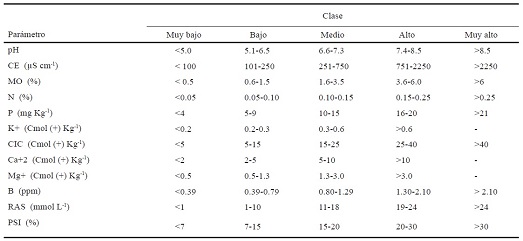Analysis of soil quality in the intensive production of chile (Capsicum annuum L.) in the region irrigated by the aquifer, Calera, Zacatecas, México
DOI:
https://doi.org/10.28940/terra.v40i0.942Keywords:
soil fertility, chili production, intensive agricultureAbstract
In Mexico, the productive systems of chili (Capsicum spp.) have been gradually intensif ied in order to obtain better yields and generate higher incomes, a situation that has positioned the country as the second producer and main exporter of chili in the world, generating on average per year around two billion pesos for exports; however, the intensif ication of some practices associated with this agricultural activity have generated infertility and salinization of the soil, which is why the objective of the research is to evaluate the agronomic quality of the soil in dif ferent chili-producing areas in the Calera del Aquifer region. Zacatecas state. During two consecutive cycles, soil sampling was carried out in accordance with NOM-021-RECNAT-2000 in plots destined for chili cultivation in order to determine fertility and physicochemical parameters. The results provided evidence of the variety of agrochemicals and the surplus of phosphorous and potassium fertilizers that are applied during the production cycle, a situation that considerably raises costs. The salt content found in the soil was low with a medium sodium absorption ratio, which classif ies them as C1-S2; high concentrations of sodium salts were not recorded and EC values were low, however, nutrient concentrations were very low despite the neutral pH. These characteristics can be attributed to the fact that they are soils with a high content of sand with compaction problems due to the conventional mechanized system and due to the lack of conservation strategies, therefore, the dynamics to produce chili in the region is having a negative impact. on soil quality.
Downloads
Publication Facts
Reviewer profiles N/A
Author statements
- Academic society
- Terra Latinoamericana
- Publisher
- Mexican Society of Soil Science, C.A.

















